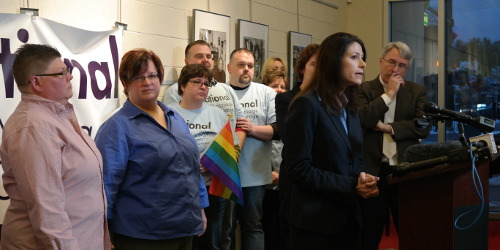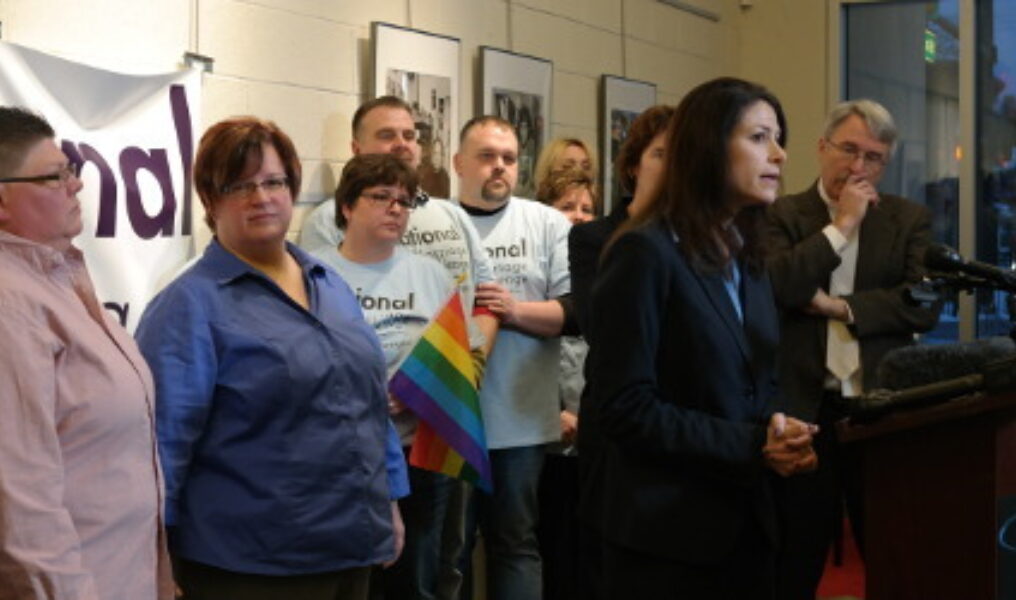By AJ Trager

April DeBoer and Jayne Rowse with their lawyer Carole M Stanyar.
WASHINGTON D.C. – The Supreme Court of the United States (SCOTUS) has granted review of four petitions from each state from the 6th Circuit Court of Appeals requesting the court to decide if same-sex marriage is recognized and protected under the U.S Constitution.
Michigan, Kentucky, Tennessee and Ohio will argue two issues before the Court: Does the 14th Amendment require a state to license a marriage between two people of the same sex and does the 14th Amendment require a state to recognize a marriage between two people of the same sex when their marriage was lawfully licensed and performed out-of-state? The review by SCOTUS is scheduled for April 27, 28 or 29.
The legal teams from the 6th Circuit Court of Appeals will present their cases to SCOTUS in two sections. Michigan and Kentucky will share a 45-minute slot to argue for the constitutionality of same-sex marriage. And Tennessee, Ohio and Kentucky will share a 30-minute window arguing for the recognition of same-sex marriages performed out-of-state. States' attorneys will have the same amount of time to argue in favor of withholding the bans on same-sex marriage.
Kentucky consolidated two cases for arguments, presented by all four states, heard by the 6th Circuit Court of Appeals in August 2014. In the first case, Bourke v Beshear, plaintiffs who were married in Canada filed a lawsuit against the state in July of 2013, challenging Kentucky's refusal to recognize their marriage. The second case, Love v Beshear, was filed in February 2012 by a couple who were denied a marriage license in Kentucky. A judge ruled that the state must recognize the marriages from other jurisdictions and shall allow for same-sex couples to marry because withholding access to same-sex marriage violates the U.S. Constitution's guarantee of equal protection under the law. Kentucky is the only case that will argue both questions posed before the court.
The Ohio case, Obergefell v Hodges, was filed in July 2013 as plaintiffs Jim Obergefell and John Arthur sought recognition of their marriage performed in Maryland to be on Arthur's death certificate before he passed. The American Civil Liberties Union (ACLU) of Ohio filed on behalf of Obergefell and five other couples, among which were three widowers and a funeral director. If customary practice is followed, the first case listed in the order – the Ohio case – will become the historic title for the final ruling, SCOTUSblog.com reports.
In Tennessee, four couples came together in March 2014, represented by the National Center for Lesbian Rights, to argue that the state's refusal to recognize their out-of-state marriages constitutes discrimination on the basis of sexual orientation and violates their rights to due process and equal protection.
DeBoer v Snyder, the Michigan case arguing that the state ban on same-sex marriage is unconstitutional, was originally filed in 2012 as an adoption case. Plaintiffs April DeBoer and Jayne Rowse were denied second-parent adoption rights on the grounds that they weren't married. Since they couldn't get married legally in Michigan, they filed a lawsuit that was later changed, per judge's request, to include arguments for same-sex marriage. On March 21, 2014, Federal Judge Bernard Friedman ruled that Michigan's ban on same-sex marriage was unconstitutional. The decision was stayed later the next day, but only after more than 300 same-sex couples were married in the state.
"Taking both marriage and marriage recognition means that the court is ready now to answer the issue broadly," Carole M. Stanyar, lawyer for the DeBoer team, said in a press conference directly following the announcement to hear same-sex marriage.
In a decision made in October, SCOTUS refused to hear appeals from rulings allowing same-sex marriage in five states. The decision expanded the number of states with same-sex marriage from 19 to 24, along with the District of Columbia.
That decision paved the way for marriage equality throughout the country as federal judges from 12 other states found same-sex marriage bans unconstitutional.
In November, the 6th Circuit Court of Appeals ruled in favor of the states' ban on same-sex marriage creating an Appellate Court split which, many have speculated, added pressure for SCOTUS to take up the same-sex marriage issue in its 2015 term.
Currently 160,000 same-sex couples and their 60,000 children live in the 14 states and Puerto Rico where same-sex marriage bans are currently being enforced, the Williams Institute reports.
Virtually every court up until this point, including the 4th, 7th, 9th and 10th Circuits and 59 percent of the American people (which includes Republicans under age 45), support the freedom to marry.
"After the Justice Department's decision not to defend the constitutionality of Section 3 of the Defense of Marriage Act, the Supreme Court sent a powerful message that Americans in same-sex marriages are entitled to equal protection and equal treatment under the law. This landmark decision marked a historic step toward equality for all American families," Attorney General for the United States Eric Holder said in a statement made Jan. 16.
"As these cases proceed, the Department of Justice will remain committed to ensuring that the benefits of marriage are available as broadly as possible. And we will keep striving to secure equal treatment for all members of society – regardless of sexual orientation."
Preparing to present before SCOTUS will cost upwards of $1 million. The organization National Marriage Challenge, formally known as Michigan Marriage Challenge, is accepting donations that will go directly towards strengthening the provisions of the Michigan legal team. Go to www.michiganmarriagechallenge.com to donate and help the DeBoer-Rowse family argue marriage equality for the entire nation.










